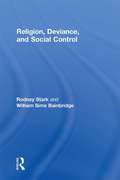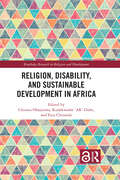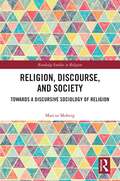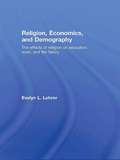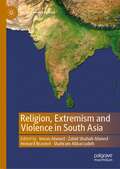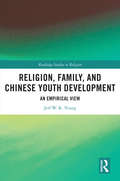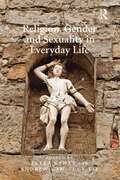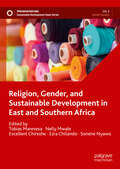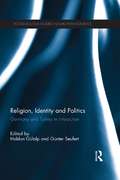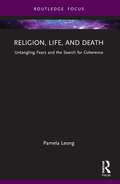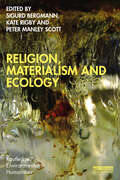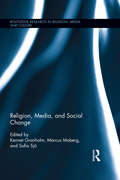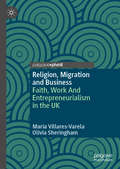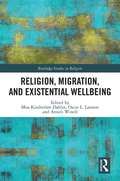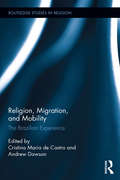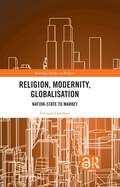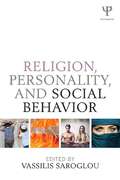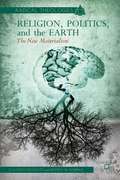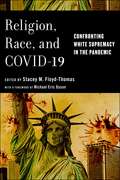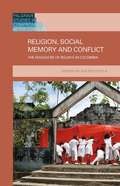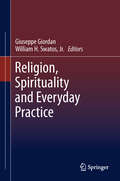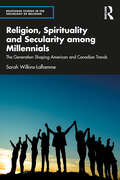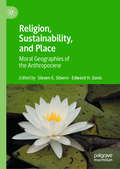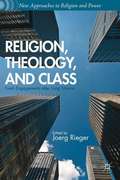- Table View
- List View
Religion, Deviance, and Social Control
by Rodney Stark William Sims BainbridgeDoes religion have the power to regulate human behavior? If so, under what conditions can it prevent crime, delinquency, suicide, alcoholism, drug abuse, or joining cults? Despite the fact that ordinary citizens assume religion deters deviant behavior, there has been little systematic scientific research on these crucial questions. This book is the first comprehensive analysis, drawing on a wide range of historical and contemporary data, and written in a style that will appeal to readers from many intellectual backgrounds.
Religion, Disability, and Sustainable Development in Africa (Routledge Research in Religion and Development)
by Ezra Chitando Chioma Ohajunwa Kudakwashe ‘ak’ DubeThis book investigates the interplay between disability and religion in Africa, and what this means in the context of the Sustainable Development Goals.The importance of meeting the needs of people with disabilities is highlighted specifically in several Sustainable Development Goals, as well as being emphasised as a cross-cutting issue across all the goals. Over 1 billion people are estimated to be living with disabilities, and 80% of this population live in the Global South, many within Africa. This book argues that within this context, religion must be considered, as people with disabilities often turn to religion for solace in confronting the daily struggles and pains that they face. Drawing on multiple disciplinary lenses, this book reflects on how traditional/indigenous, Abrahamic, and other African minority religions and philosophies interact with disability, and how this relates to the Sustainable Development Goals. The book demonstrates how religions in Africa conceptualise, imagine, or re-imagine disability in the context of key themes such as gender, ecological justice, health, poverty, education, employment, entrepreneurship, and migration.Overall, the book invites researchers from across the social sciences to consider how African religious, theological, and philosophical ideas can help towards the inclusion of people with disabilities in the 2030 development agenda in Africa.
Religion, Discourse, and Society: Discourse Theory and Analysis for the Sociology of Religion (Routledge Studies in Religion)
by Marcus MobergThis book focuses on the utility and application of discourse theory and discourse analysis in the sociological study of religious change. It presents an outline of what a ‘discursive sociology of religion’ looks like and brings scholarly attention to the role of language and discourse as a significant component in contemporary processes of religious change. Marcus Moberg addresses the concept of discourse and its main meta-theoretical underpinnings and discusses the relationship between discourse and ‘religion’ in light of previous research. The chapters explore key notions such as secularism and public religion as well as the ideational and discursive impact of individualism and market society on the contemporary Western religious field. In addition to providing scholars with a thorough understanding and appreciation of the analytic utility of discourse theory and analysis in the sociological study of religious change, the book offers a cohesive and systematized framework for actual empirical analysis.
Religion, Economics and Demography: The Effects of Religion on Education, Work, and the Family (Routledge Frontiers of Political Economy)
by Evelyn LehrerUsing the tools of economics, this book analyses how religion affects decisions and outcomes in a wide range of areas, including education, employment, family size, entry into cohabitation and formal marriage, the choice of spouse and divorce. In each case, the relationships are rigorously quantified based on multivariate statistical analyses of large scale US data. The results show, for example, that when people marry outside their faith, there is an increase in the probability of divorce, the magnitude of the adverse effect depending in part on the ecumenical/exclusivist nature of the two religions. Other analyses show that youth who grow up with some religion in their lives are less likely than their counterparts with little or no religious involvement to drop out of high school or enter cohabiting arrangements at a young age. Overall, both religious affiliation and the extent of participation in religious activities are found to have far-reaching implications for economic and demographic behaviour. The book contains a wealth of data illustrating how the religious and secular realms of people’s lives are intimately intertwined. With its economic perspective, it offers new ways of thinking about these relationships and is a valuable resource for students and scholars interested in the role of religion in education, work and the family.
Religion, Extremism and Violence in South Asia (Politics of South Asia)
by Imran Ahmed Shahram Akbarzadeh Howard Brasted Zahid Shahab AhmedThis book sheds light on religiously motivated extremism and violence in South Asia, a phenomenon which ostensibly poses critical and unique challenges to the peace, security and governance not only of the region, but also of the world at large. The book is distinctive in-so-far as it reexamines conventional wisdom held about religious extremism in South Asia and departs from the literature which centres its analyses on Islamic militancy based on the questions and assumptions of the West’s ‘war on terror’. This volume also offers a comprehensive analysis of new extremist movements and how their emergence and success places existing theoretical frameworks in the study of religious extremism into question. It further examines topical issues including the study of social media and its impact on the evolution and operation of violent extremism. The book also analyses grassroots and innovative non-state initiatives aimed to counter extremist ideologies. Through case studies focusing on Bangladesh, India, Pakistan and Sri Lanka, this collection examines extremist materials, methods of political mobilisation and recruitment processes and maps the interconnected nature of sociological change with the ideological transformations of extremist movements.
Religion, Family, and Chinese Youth Development: An Empirical View (Routledge Studies in Religion)
by Jerf W. YeungReligion is a fundamental cultural factor profoundly influential on human mental health and behavioural choices, and, in addition, family is the most proximal and intimate socialization agent contributive to youth development. Religion, Family, and Chinese Youth Development explores how religious involvement of Chinese parents affects their psychological health and family socialization, which leads to various aspects of the development of Chinese youths. Specifically, a structural relationship between religion, family socialization, and youth development was constructed theoretically and tested empirically in the Chinese context, which can portray the linked lives of religious involvement of Chinese parents, parental psychological health, family processes, parenting practices, the development of psychosocial maturity, and the internalizing and externalizing outcomes of Chinese youths. Undeniably, the findings of this book provide insightful social and policy implications for researchers and human service practitioners related to Chinese societies. By clearly depicting and empirically testing the connections between religion, family, and Chinese youth development, the book can be a reference for clergy, family practitioners, researchers, policy makers, management of NGOs, and graduate students of social sciences.
Religion, Gender and Sexuality in Everyday Life: The Politics Of Collective And Individual Identities
by Peter NynäsExploring the intersection between religion, gender and sexuality within the context of everyday life, this volume examines contested identities, experiences, bodies and desires on the individual and collective levels. With rich case studies from the UK, USA, Europe, and Asia, Religion, Gender and Sexuality in Everyday Life sheds light on the manner in which individuals appropriate, negotiate, transgress, invert and challenge the norms and models of various religions in relation to gender and sexuality, and vice versa. Drawing on fascinating research from around the world, this book charts central features of the complexities involved in everyday life, examining the messiness, limits, transformations and possibilities that occur when subjectivities, religious and cultural traditions, and politics meet within the local as well as transnational contexts. As such, it will be of interest to scholars of sociology, anthropology, geography and cultural studies examining questions of religion and spirituality, gender and sexuality, and individual and collective identities in contemporary society.
Religion, Gender, and Sustainable Development in East and Southern Africa (Sustainable Development Goals Series)
by Ezra Chitando Tobias Marevesa Nelly Mwale Excellent Chireshe Sonene NyawoThis volume brings to the fore the intersections of religion, gender and sustainable development in 21st century Africa from an interdisciplinary perspective. The volume explores and presents a coherent, research supported argument for the role of religion in promoting gender justice and sustainable development. Contributing authors explicate how the nexus between religion and gender can be utilized as the backdrop for achieving sustainable development in Africa, focusing on Sustainable Development Goal (SDG) 5, “Achieve gender equality and empower all women and girls.” Chapters in this volume focus on a variety of topics, including, how African Traditional Religions, Christianity (mainline, AICs, Pentecostalism), Islam, Rastafari, etc., are being used to promote SDG 5 in African countries.
Religion, Identity and Politics: Germany and Turkey in Interaction (Studies in European Sociology)
by Haldun Gülalp Günter SeufertGerman–Turkish relations, which have a long history and generally unrecognized depth, have rarely been examined as mutually formative processes. Isolated instances of influence have been examined in detail, but the historical and still ongoing processes of mutual interaction have rarely been seriously considered. The ruling assumption has been that Germany may have an impact on Turkey, but not the other way around. Religion, Identity and Politics examines this mutual interaction, specifically with regard to religious identities and institutions. It opposes the commonly held assumption that Europe is the abode of secularism and enlightenment, while the lands of Islam are the realm of backwardness and fundamentalism. Both historically and contemporarily, Germany has treated religion as a core aspect of communal and civilizational identity and framed its institutions accordingly; the book explores how there has been, and continues to be, a mutual exchange in this regard between Germany and both the Ottoman Empire and modern Turkey. The authors show that the definition of identity and regulation of communities have been explicitly based on religion until the early and since the late twentieth century; the period in between– the age of secular nationalism– which has always been treated as the norm, now appears more clearly as an exception. This book will be of interest to students and scholars of sociology, politics, history and religion.
Religion, Life, and Death: Untangling Fears and the Search for Coherence (Routledge Advances in Sociology)
by Pamela LeongBased on a content analysis of writing assignments from a class on death and dying, this book focuses on the manner in which college students use religion to make sense of death and the dying process. Drawing on research spanning five years, the author considers the attitudes, concerns, and beliefs about death, exploring students’ perspectives on the place of religion in end-of-life issues. With attention to questions related to death anxiety, suicide, mass homicide, and the death of young children, the author examines the ways in which students draw on religion to make sense of death, religion’s function as both a source of comfort and empowerment and a source of distress, as well as the perceptions of those who resist religion. As such, Religion, Life, and Death will appeal to social scientists with interests in the sociology of young adults, and the sociology and psychology of religion, death, and dying.
Religion, Materialism and Ecology (Routledge Environmental Humanities)
by Sigurd Bergmann, Kate Rigby and Peter Manley ScottThis timely collection of essays by leading international scholars across religious studies and the environmental humanities advances a lively discussion on materialism in its many forms. While there is little agreement on what ‘materialism’ means, it is evident that there is a resurgence in thinking about matter in more animated and active ways. The volume explores how debates concerning the new materialisms impinge on religious traditions and the extent to which religions, with their material culture and beliefs in the Divine within the material, can make a creative contribution to debates about ecological materialisms. Spanning a broad range of themes, including politics, architecture, hermeneutics, literature and religion, the book brings together a series of discussions on materialism in the context of diverse methodologies and approaches. The volume investigates a range of issues including space and place, hierarchy and relationality, the relationship between nature and society, human and other agencies, and worldviews and cultural values. Drawing on literary and critical theory, and queer, philosophical, theological and social theoretical approaches, this ground-breaking book will make an important contribution to the environmental humanities. It will be a key read for postgraduate students, researchers and scholars in religious studies, cultural anthropology, literary studies, philosophy and environmental studies.
Religion, Media, and Social Change (Routledge Research in Religion, Media and Culture)
by Marcus Moberg Kennet Granholm Sofia SjöIn an era of heightened globalization, macro-level transformations in the general socioeconomic and cultural makeup of modern societies have been studied in great depth. Yet little attention has been paid to the growing influence of media and mass-mediated popular culture on contemporary religious sensibilities, life, and practice. Religion, Media, and Social Change explores the correlation between the study of religion, media, and popular culture and broader sociological theorizing on religious change. Contributions devote serious attention to broadly-defined media including technologies, institutions, and social and cultural environments, as well as mass-mediated popular culture such as film, music, television, and computer games. This interdisciplinary collection addresses important theoretical and methodological questions by connecting the study of media and popular culture to current perspectives, approaches, and discussions in the broader sociological study of religion.
Religion, Migration and Business: Faith, Work And Entrepreneurialism in the UK (Religion and Global Migrations)
by Olivia Sheringham María Villares-VarelaThis book critically interrogates the role of religious faith in the experiences and practices of migrant entrepreneurs against the backdrop of neoliberal Britain. Focussing on Pentecostalism, a popular Christian denomination amongst migrant groups in the UK, the authors draw on primary qualitative data to examine the ways in which Pentecostal beliefs and values influence the aspirations and practices of migrant entrepreneurs. The book also explores the role of Pentecostal churches in supporting entrepreneurial activities among migrant communities, arguing that these institutions simultaneously comply and contest the formation of neoliberal subjectivities: providing cultural legitimacy to the entrepreneurial subject, whilst also contesting the community erosion of neoliberalism, (particularly in an austerity context) and fostering a strong a sense of belonging among congregants. The book offers an interdisciplinary perspective spanning sociology, geography and entrepreneurship studies to explain how values and faith networks shape everyday life, work and entrepreneurial practices.
Religion, Migration, and Existential Wellbeing: Theorizing the Role of Religion in Contemporary Migration and Integration Governance (Routledge Studies in Religion)
by Moa Kindström DahlinThis book uses the very latest research to examine current interactions between religion, migration and existential wellbeing. In particular, it demonstrates the role of religion and religious organizations in the social, medical and existential wellbeing of immigrants within their host societies. By focusing on the role and politics of religion and religious organisations as well as the religious identity and faith of individuals, it highlights the connection between existential wellbeing, integration and social cohesion. The book brings together researchers from various disciplines taking on the challenge to elaborate on the theme of this book from different perspectives, using different methods and theories with a wide selection of cases from various parts of the world. The value of multidisciplinary research on the role of religion in a globalised society – locally, nationally and internationally – is important for understanding the composition and potential solutions to social and political problems. Religious aspects and organisations are present in legal, political and social forms of governance and form the basis for future research on e.g. secularisation, democracy, minorities, human rights, welfare, healthcare and identity formation. These and other related topics are discussed in this book. This book is an up-to-date and multifaceted study of how religion engages with the mass movement of peoples. As such, it will be of great interest to any scholar of Religious Studies, Migrant Studies, Sociology of Religion, Religion and Politics, as well as Legal Studies with a human right focus.
Religion, Migration, and Mobility: The Brazilian Experience (Routledge Studies in Religion)
by Andrew Dawson Cristina Maria CastroFocusing on migration and mobility, this edited collection examines the religious landscape of Brazil as populated and shaped by transnational flows and domestic migratory movements. Bringing together interdisciplinary perspectives on migration and religion, this book argues that Brazil’s diverse religious landscape must be understood within a dynamic global context. From southern to northern Europe, through Africa, Japan and the Middle East, to a host of Latin American countries, Brazilian society has been influenced by immigrant communities accompanied by a range of beliefs and rituals drawn from established ‘world’ religions as well as alternative religio-spiritual movements. Consequently, the formation and profile of ‘homegrown’ religious communities such as Santo Daime, the Dawn Valley and Umbanda can only be fully understood against the broader backdrop of migration. Contributors draw on the case of Brazil to develop frameworks for understanding the interface of religion and migration, asking questions that include: How do the processes and forces of re-territorialization play out among post-migratory communities? In what ways are the post-transitional dynamics of migration enacted and reframed by different generations of migrants? How are the religious symbols and ritual practices of particular worldviews and traditions appropriated and re-interpreted by migrant communities? What role does religion play in facilitating or impeding post-migratory settlement? Religion, Migration and Mobility engages these questions by drawing on a range of different traditions and research methods. As such, this book will be of keen interest to scholars working across the fields of religious studies, anthropology, cultural studies and sociology.
Religion, Modernity, Globalisation: From Nation-State to Market (Routledge Studies in Religion)
by François GauthierThis book argues that the last four decades have seen profound and important changes in the nature and social location of religion, and that those changes are best understood when cast against the associated rise of consumerism and neoliberalism. These transformations are often misunderstood and underestimated, namely because the study of religion remains dependent on the secularisation paradigm which can no longer provide a sufficiently fruitful framework for analysis. The book challenges diagnoses of transience and fragmentation by proposing an alternative narrative and set of concepts for understanding the global religious landscape. The present situation is framed as the result of a shift from a National-Statist to a Global-Market regime of religion. Adopting a holistic perspective that breaks with the current specialisation tendencies, it charts the emergence of the State and the Market as institutions and ideas related to social order, as well as their changing rapports from classical modernity to today. Breaking with a tradition of Western-centeredness, the book offers probing enquiries into Indonesia and a synthesis of global and Western trends. This long-awaited book offers a bold new vision for the social scientific study of religion and will be of great interest to all scholars of the Sociology and Anthropology of religion, as well as Religious Studies in general.
Religion, Modernity, Globalisation: Nation-State to Market (Routledge Studies in Religion)
by François GauthierThis book argues that the last four decades have seen profound and important changes in the nature and social location of religion, and that those changes are best understood when cast against the associated rise of consumerism and neoliberalism. These transformations are often misunderstood and underestimated, namely because the study of religion remains dependent on the secularisation paradigm which can no longer provide a sufficiently fruitful framework for analysis.The book challenges diagnoses of transience and fragmentation by proposing an alternative narrative and set of concepts for understanding the global religious landscape. The present situation is framed as the result of a shift from a National-Statist to a Global-Market regime of religion. Adopting a holistic perspective that breaks with the current specialisation tendencies, it charts the emergence of the State and the Market as institutions and ideas related to social order, as well as their changing rapports from classical modernity to today. Breaking with a tradition of Western-centeredness, the book offers probing enquiries into Indonesia and a synthesis of global and Western trends.This long-awaited book offers a bold new vision for the social scientific study of religion and will be of great interest to all scholars of the Sociology and Anthropology of religion, as well as Religious Studies in general.The Open Access version of this book, available at http://www.taylorfrancis.com, has been made available under a Creative Commons-Attribution-Non Commercial-No Derivatives (CC BY-NC-ND) 4.0 license.
Religion, Personality, and Social Behavior
by Vassilis SaroglouPsychological interest in religion, in terms of both theory and empirical research, has been constant since the beginning of psychology. However, since the beginning of the 21st Century, partially due to important social and political events and developments, interest in religion within personality and social psychology has increased. This volume reviews the accumulated research and theory on the major aspects of personality and social psychology as applied to religion. It provides a high quality integrative, systematic, and rigorous review of that work, with a focus on topics that are both central in personality and social psychology and have allowed for the accumulation of solid and replicated and not impressionist knowledge on religion. The contributors are renowned researchers in the field who offer an international perspective that is both illuminating, yet neutral, with respect to religion. The volume’s primary audience are academics, researchers, and advanced students in social psychology, but it will also interest those in sociology, political sciences, and anthropology.
Religion, Politics, and the Earth
by Jeffrey W. Robbins Clayton Crockett"Following Vattimo's postmodern philosophy, Badiou's postmetaphysical ontology, and i ek's revolutionary style, the authors of this marvelous book invites us to reactivate our politics of resistance against our greatest enemy: corporate capitalism. The best solution to the ecological, energy, and financial crisis corporate capitalism has created, as Crockett Clayton and Jeffrey Robbins suggest, is a new theological materialism where Being is conceived as energy both subjectively and objectively. All my graduate students will have to read this book carefully if they want to become philosophers. " - Santiago Zabala, ICREA Research Professor at the University of Barcelona "This is a book of an extraordinary timeliness, written in an accessible and strikingly informative way. It is excellently poised to become a synthetic and agenda setting statement about the implications of a new materialism for the founding of a new radical theology, a new kind of spirituality. I consider this therefore quite a remarkable book which will be influential in ongoing discussions of psychoanalysis, continental philosophy, and theology. Moreover, it will be, quite simply, the best book about spirituality and the new materialism on the market today. While all of the work of the new materialists engage at one level or another the question of a new spirituality, I do not think there is anything comparable in significance to what Crockett and Robbins have provided here. " - Ward Blanton, University of Kent "This book will perhaps be most appreciated by the reader with an intuitive cast of mind, able to recognize the force of an argument in its imaginative suggestiveness . . . New Materialism is about energy transformation, we are told, energy which cannot be reduced to matter because it resonates with spirit and life . . . Yet the book strikes a fundamental note of hard reality: 'if we want our civilization to live on earth a little longer we will have to recognize our coexistence with and in earth'. " - Christian Ecology Link
Religion, Race, and COVID-19: Confronting White Supremacy in the Pandemic (Religion and Social Transformation)
by Stacey M. Floyd-ThomasExamines how the dynamics emerging from the pandemic affect our most vulnerable populations and shape a new religious landscapeThe COVID-19 pandemic upset virtually every facet of society and, in many cases, exposed gross inequality and dysfunction. The particular dynamics emerging from the coronavirus pandemic have been felt most intensely by America’s most vulnerable populations, who are disproportionately people of color and the working poor, the people whom the Bible refers to as “the least of these.”This book makes the case that the pandemic was not just a medical phenomenon, or an economic or social one, but also a religious one. Religious practice has been altered in profound ways. Controversies around religious freedom have been re-ignited over debates concerning whether government can restrict church services. Christian white supremacists not only defied shelter in place orders, but found new ways to propagate racist attacks, with their White Christian identity fueling their reactions to the pandemic. Some religious leaders, including those in communities of color, saw the virus as an indicator of God’s wrath, or as a divine test, and viewed altering their traditional practices to mitigate the virus’s spread as a weakening of faith.Religion, Race, and COVID-19 argues that there is a religious hierarchy in US society that puts “the least of these” last while prioritizing those who benefit most from white privilege. Yet these vulnerable populations draw on theological and religious resources to contend with these existential threats. The volume shows how social transformation occurs when faith is both formed and informed during crises, offering compelling insight into the saliency and lasting impact of religiosity within human culture.
Religion, Social Memory and Conflict
by Sandra Milena Rios OyolaThe field of transitional justice and reconciliation considers social memory to be an important mechanism for acknowledging the violation of victims' rights and a step toward building peace. Societies in conflict, such as Colombia, challenge our current understanding of using memory in the construction of social peace processes, which in turn question the impossibility of forgiving violence that is still to come. Drawing on original ethnographical research, Rios analyses strategies of memorialization after the massacre of Bojay#65533;, Colombia, as an arena of political contention but also of grassroots resistance to persistent and diverse forms of violence. The book focuses on the work of the local grassroots Catholic Church and of the victims' association ten years after the massacre of Bojay#65533;. It explores the role of religion in the management of victims' emotions and in supporting claims of transitional justice from a grassroots perspective in a context of thin political transition.
Religion, Spirituality and Everyday Practice
by William H. Swatos Jr. Giuseppe GiordanThe current generation of young adults, at least in the Western world, has shown a marked tendency toward a preference for describing themselves as "spiritual" as contrasted to "religious." This book seeks to examine the possible meanings and consequences associated with this contrast in terms of the similarities and differences that affect those who use these terms with respect to the everyday practices that they themselves employ or believe should follow from being self-defined as "religious" or "spiritual" - or not. The several chapters in this volume take up the religious-spiritual contrast specifically through investigations into practice: In what ways do people who claim to be "religious" or "spiritual" define these self-images as manifest in their own lives? How on a daily basis does a person who considers himself or herself "religious" or "spiritual" live out that self-image in specific ways that she or he can describe to others, even if not share with others? Are there ways that being "spiritual" can involve religion or ways that being "religious" can involve spirituality, and if so, how do these differ from concepts in prior eras (e.g., Ignatian spirituality, Orthodox spirituality, Anglican spirituality, etc.)? We also explore if there are institutions of spiritual practice to which those who term themselves "spiritual" turn, or if the difference implied by these terms may instead be between institutionalized and de-institutionalized expressions of practice, including but not limited to self-spiritualities.
Religion, Spirituality and Secularity among Millennials: The Generation Shaping American and Canadian Trends (Routledge Studies in the Sociology of Religion)
by Sarah Wilkins-LaflammeThis book explores the world of religion, spirituality and secularity among the Millennial generation in the United States and Canada, with a focus on the ways Millennials are doing (non)religion differently in their social lives compared with their parents and grandparents. It considers the influences exercised on the (non)religious and spiritual landscapes of young adults in North America by the digital age, precarious work, growing pluralism, extreme individualism, environmental crisis, advanced urbanism, expanded higher education, emerging adulthood, and a secular age. Based on extensive primary and secondary quantitative data, complemented with high-quality qualitative research, including interviews and focus groups, this book offers cross-national comparisons between the United States and Canada to highlight the impact of different social environments on the experience of religion, spirituality and secularity among the continent’s most numerous generation. As such, it will appeal to scholars of religion and sociology, with interests in religious and societal change as well as in religious practice among young adults.
Religion, Sustainability, and Place: Moral Geographies of the Anthropocene
by Steven E. Silvern Edward H. DavisThis book explores how religious groups work to create sustainable relationships between people, places and environments. This interdisciplinary volume deepens our understanding of this relationship, revealing that the geographical imagination—our sense of place—is a key aspect of the sustainability ideas and practices of religious groups. The book begins with a broad examination of how place shapes faith-based ideas about sustainability, with examples drawn from indigenous Hawaiians and the sacred texts of Judaism and Islam. Empirical case studies from North America, Europe, Central Asia and Africa follow, illustrating how a local, bounded, and sacred sense of place informs religious-based efforts to protect people and natural resources from threatening economic and political forces. Other contributors demonstrate that a cosmopolitan geographical imagination, viewing place as extending from the local to the global, shapes the struggles of Christian, Jewish and interfaith groups to promote just and sustainable food systems and battle the climate crisis.
Religion, Theology, And Class
by Joerg RiegerThis important collection of essays addresses the question of why scholars can no longer do without class in religious studies and theology, and what we can learn from a renewed engagement with the topic. This volume discusses what new discourses regarding notions of gender, ethnicity, and race might add to developments on notions of class.
